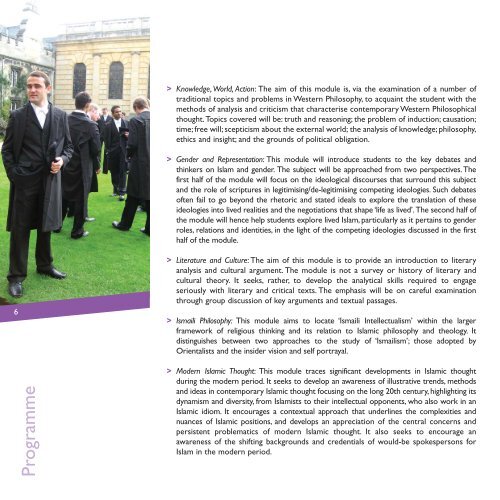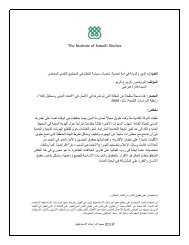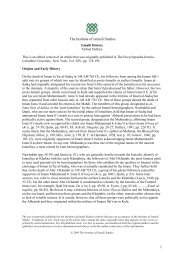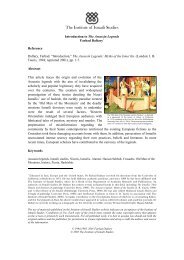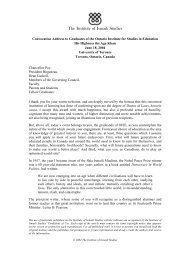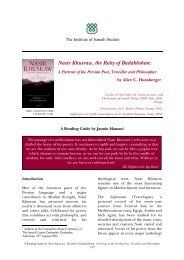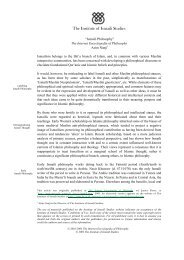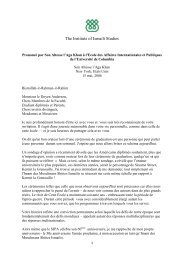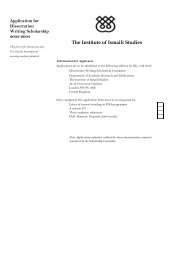GPISH prospectus 2011_Layout 1.qxd - The Institute of Ismaili Studies
GPISH prospectus 2011_Layout 1.qxd - The Institute of Ismaili Studies
GPISH prospectus 2011_Layout 1.qxd - The Institute of Ismaili Studies
Create successful ePaper yourself
Turn your PDF publications into a flip-book with our unique Google optimized e-Paper software.
Knowledge, World, Action: <strong>The</strong> aim <strong>of</strong> this module is, via the examination <strong>of</strong> a number <strong>of</strong><br />
traditional topics and problems in Western Philosophy, to acquaint the student with the<br />
methods <strong>of</strong> analysis and criticism that characterise contemporary Western Philosophical<br />
thought. Topics covered will be: truth and reasoning; the problem <strong>of</strong> induction; causation;<br />
time; free will; scepticism about the external world; the analysis <strong>of</strong> knowledge; philosophy,<br />
ethics and insight; and the grounds <strong>of</strong> political obligation.<br />
> Gender and Representation: This module will introduce students to the key debates and<br />
thinkers on Islam and gender. <strong>The</strong> subject will be approached from two perspectives. <strong>The</strong><br />
first half <strong>of</strong> the module will focus on the ideological discourses that surround this subject<br />
and the role <strong>of</strong> scriptures in legitimising/de-legitimising competing ideologies. Such debates<br />
<strong>of</strong>ten fail to go beyond the rhetoric and stated ideals to explore the translation <strong>of</strong> these<br />
ideologies into lived realities and the negotiations that shape ‘life as lived’. <strong>The</strong> second half <strong>of</strong><br />
the module will hence help students explore lived Islam, particularly as it pertains to gender<br />
roles, relations and identities, in the light <strong>of</strong> the competing ideologies discussed in the first<br />
half <strong>of</strong> the module.<br />
6<br />
Programme<br />
> Literature and Culture: <strong>The</strong> aim <strong>of</strong> this module is to provide an introduction to literary<br />
analysis and cultural argument. <strong>The</strong> module is not a survey or history <strong>of</strong> literary and<br />
cultural theory. It seeks, rather, to develop the analytical skills required to engage<br />
seriously with literary and critical texts. <strong>The</strong> emphasis will be on careful examination<br />
through group discussion <strong>of</strong> key arguments and textual passages.<br />
> <strong>Ismaili</strong> Philosophy: This module aims to locate ‘<strong>Ismaili</strong> Intellectualism’ within the larger<br />
framework <strong>of</strong> religious thinking and its relation to Islamic philosophy and theology. It<br />
distinguishes between two approaches to the study <strong>of</strong> ‘<strong>Ismaili</strong>sm’; those adopted by<br />
Orientalists and the insider vision and self portrayal.<br />
> Modern Islamic Thought: This module traces significant developments in Islamic thought<br />
during the modern period. It seeks to develop an awareness <strong>of</strong> illustrative trends, methods<br />
and ideas in contemporary Islamic thought focusing on the long 20th century, highlighting its<br />
dynamism and diversity, from Islamists to their intellectual opponents, who also work in an<br />
Islamic idiom. It encourages a contextual approach that underlines the complexities and<br />
nuances <strong>of</strong> Islamic positions, and develops an appreciation <strong>of</strong> the central concerns and<br />
persistent problematics <strong>of</strong> modern Islamic thought. It also seeks to encourage an<br />
awareness <strong>of</strong> the shifting backgrounds and credentials <strong>of</strong> would-be spokespersons for<br />
Islam in the modern period.


